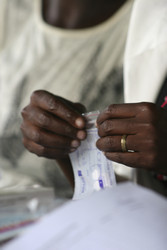Rapid cost-effective disease treatment trialled in East Africa
Research organisations from East Africa and Europe are working together in order to tackle co-infections of HIV and visceral leishmaniasis (VL) — this combination of diseases can be fatal if left untreated. Around 500 000 cases of VL occur every year, with East Africa one of the key endemic regions. Leishmaniasis is spread by the bite of certain types of sandflies. The EU-funded AFRICOLEISH project, launched in 2013 through a EUR 3 million grant from the EU, hopes to develop – and demonstrate – new ways of treating patients suffering from both conditions. Co-infection is an emerging problem in East Africa, and when the two diseases occur together, treatment becomes much more challenging. At present, AFRICOLEISH is assessing the efficacy and safety of two possible treatments in the first randomised clinical trial in Africa of its kind. These studies are being conducted in Gondar and Abdurafi, Ethiopia. A total of 132 patients will be recruited for the trial. The project team is hoping that field tests will provide conclusive evidence on the World Health Organisation (WHO)’s recommendation of treating VL/HIV co-infected patients using a specific combination of drugs. Following these trials, AFRICOLEISH will then develop and deliver a package of care to specifically address the needs of HIV-positive VL patients in East Africa. This package will consist of the safe and effective administration of two drugs to shorten treatment duration to 28 days, methods to prevent VL from developing in HIV-infected patients and the safe and effective treatment of VL in HIV co-infected patients. The hope is that by combining better initial cure treatments and preventing relapses, co-infected patients will stand a much better chance of survival, and the disease will be contained. Indeed, effective treatments are of critical importance in saving lives and ensuring that VL does not spread. The risk of death from this disease is nine times higher in patients who are co-infected with HIV. VL also accelerates the progression of HIV, and relapses of VL in patients co-infected with HIV are very common. Furthermore, existing VL therapies can be costly and difficult to administer. Results of the clinical trials and supporting studies will be disseminated in order to encourage the uptake of new treatments in East Africa, and to support national treatment adoption programmes. This will make a significant difference to patient care in the region, establishing safe, effective and short treatments and reducing costs for health providers. Furthermore, while East Africa has been hard hit by co-infection, the implications of the AFRICOLEISH project will have worldwide resonance. VL-HIV cases have been reported in 35 countries worldwide, from Southern Europe to the Indian subcontinent and Latin America. The project, due for completion in 2015, has brought together key experts in the field: the Drugs for Neglected Diseases initiative (DNDi); the Institute of Tropical Medicine in Antwerp (ITM-Antwerp); the London School of Hygiene and Tropical Medicine (LSHTM); Médecins Sans Frontieres (MSF, The Netherlands); the Institute of Endemic Diseases, University of Khartoum (IEND), Sudan; and the University of Gondar (UoG), Ethiopia. For further information, please visit: http://www.africoleish.org/
Countries
Switzerland



